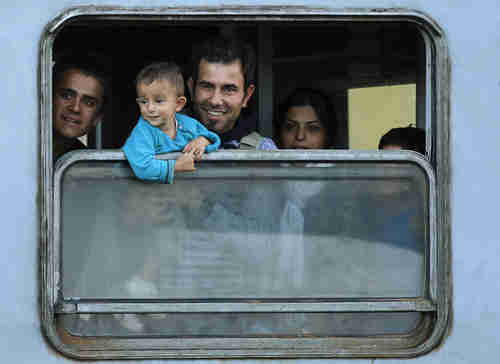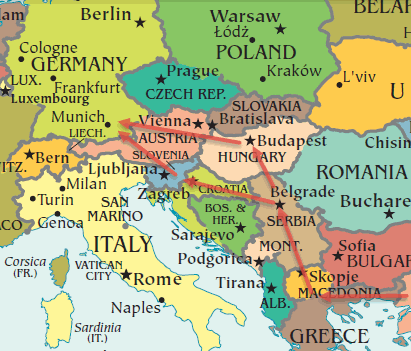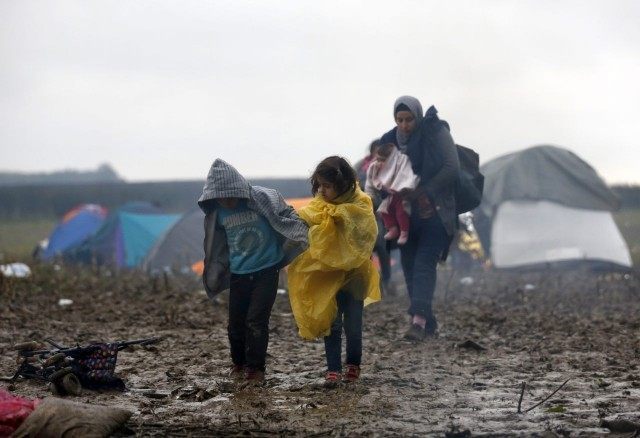This morning’s key headlines from GenerationalDynamics.com
- A cynical Turkey rejects Europe’s ‘concentration camp’ refugee proposal
- As winter approaches, thousands of European refugees may be trapped in the cold
A cynical Turkey rejects Europe’s ‘concentration camp’ refugee proposal

Members of a migrant family look out from a train window at a station in Cakovec, Croatia (Reuters)
As we reported yesterday, German Chancellor Angela Merkel visited Turkey’s President Recep Tayyip Erdogan in Istanbul on Sunday, asking for help with the refugee problem. Merkel offered 3 billion euros in aid and promised to help Turkey join the European Union if Turkey could take steps to block the transfer of migrants leaving Turkey for Europe.
Turkey’s prime minister Ahmet Davutoglu spoke on TV on Monday, sounding offended:
We cannot accept an understanding like ‘give us the money and Turkey is satisfied, so all migrants stay in Turkey.’ I told this to Merkel, too. No one can accept Turkey becoming a country like a concentration camp where all refugees live. […]
The 3 billion euro IPA fund proposal is no longer on the table as we have said we will not accept it. As for fresh resources, we’re talking about a 3 billion euro amount in the first stage. But we don’t want to fixate on this because the requirements may go up, and the assessment for this would need to be done annually.
Turkish editorial writers were quite cynical:
Why such haste and panic? German chancellors hardly ever visit Turkey, despite the close relations between the two countries. Merkel usually shows a barely hidden displeasure to meet her Turkish counterparts and the German government is mostly displeased with President Recep Tayyip Erdogan visiting Germany, addressing tens of thousands of supporters as if he were visiting a country of his own. Germany under Merkel’s direction and her Christian Democratic Union party has an openly professed aim to never let Turkey enter the EU even in the hypothetical case Turkey fulfills all the conditions.
No country in the EU’s history, already rich in disagreeable behavior toward candidate countries, has been so insulted and rejected as Turkey has. The accession negotiations that began in October 2005 through incredible difficulties, were virtually suspended in eight months’ time, arguing that Turkey was not abiding by the conditions of the Protocol signed previously. Greek Cyprus-flagged vessels and planes were banned in Turkish ports and airports. … In fact, the move was an open step toward sabotaging a very promising accession negotiations process. As Nathalie Nougayrede wrote in The Guardian: ‘EU accession negotiations stalled years ago, mostly because European public opinion could never accept the notion of engaging with such a large Muslim country.’
German editorial writers were also cynical, claiming that the proposal wouldn’t work anyway:
But how that is meant to happen seems unclear, if you look at a map of the country. Turkey’s border with Syria is 800 kilometers long and is just as difficult to monitor as the country’s winding Aegean coast, which faces Greece. The idea of having transit camps, which only a certain number of refugees will be allowed to leave in the direction of Europe, is also impractical. Only a small percentage of the two million Syrian refugees living in Turkey, are living in camps along the border. Most of them are in the big Turkish cities, or they are trying to travel onwards. How are you going to bring them back to the camps? Are they going to be brought back by force?
Europe is experiencing its greatest refugee crisis since World War II, and it looks like nothing is going to stop it. Today’s Zaman (Turkey) and Daily Sabah (Turkey) and Deutsche Welle
As winter approaches, thousands of European refugees may be trapped in the cold

Migrants arrive from Turkey to Greece, through Macedonia and Serbia, then proceed from there depending on which borders are still open.
With winter approaching, it had been thought that by this time the flow of migrants from the Mideast and Africa pouring into Europe would have slowed by now. Instead thousands of refugees are rushing to beat the winter. The number of arriving refugees has increased since the announcements by Hungary first that it would close the border to Serbia, and then the border to Croatia.
There are now about 6,000 migrants per day entering Europe from either the Mediterranean route — smuggled into Italy by boat from Libya — or from the Aegean Sea route — smuggled into Greece by boat from Turkey.
During the warmth of the summer, migrants had been traveling through Serbia, through Hungary to Austria and on to Germany. After Hungary built a razor-wire fence along the border with Serbia, the stream of migrants were then diverted west, into Croatia. From Croatia they traveled north back into Hungary — until Friday at midnight, when Hungary closed that border as well.
Now Croatia is diverting them further west, into Slovenia, so that they could travel north again, into Austria. The new problem is that there are about 5,000 migrants per day passing through Croatia, while Slovenia is refusing to admit more than 2,500 per day. Austria has also announced that it refuses to admit more than 1,500 per day.
So the immediate problem is that hundreds of migrants are stranded in “no-man’s land.” This refers to the strip of land between the Croatia border control and the Slovenia border control. Croatia has been letting the migrants cross over into the no-man’s land, but Slovenia is refusing to let them go further. As a result, they’re spending nights trapped, cold, wet and hungry, with little or no protection from the rain.
You don’t have to be a rocket scientist to see where all this is going. With 6,000 migrants entering Europe each day, and various border controls letting only 2,000 or through each day, there are going to be many thousands of migrants stranded at different border controls. Temperatures are already plummeting, and as October leads into November, a lot of people’s lives are going to be in danger from the cold.
It seems like a lifetime ago, but it was only in June that the European Union agreed to a plan to distribute up to 120,000 migrants to all 28 EU countries according to a quota system. That whole plan has been completely blown away, with over 700,000 migrants expected by the end of this year. The EU seems unable to deal with the crisis, but with winter approaching, something will have to be done. Reuters and NY Times and International Business Times
KEYS: Generational Dynamics, Germany, Angela Merkel, Turkey, Recep Tayyip Erdogan, Ahmet Davutoglu, Greece, Macedonia, Serbia, Croatia, Hungary, Libya
Permanent web link to this article
Receive daily World View columns by e-mail

COMMENTS
Please let us know if you're having issues with commenting.